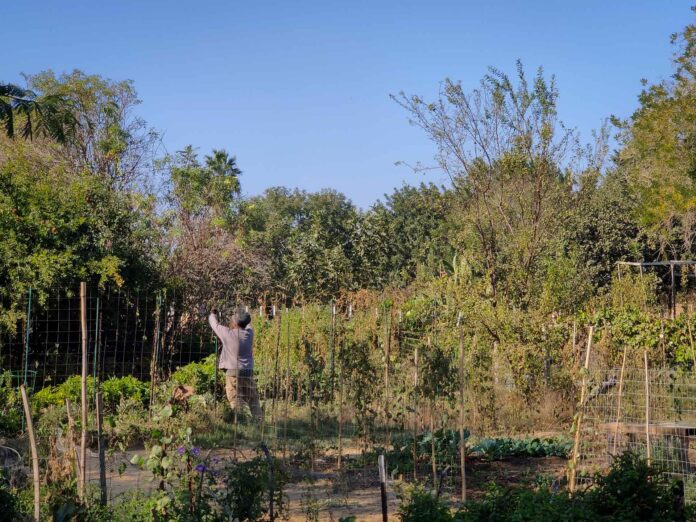Students and gardening organizations share the value that can be found in gardening
While many activities have been compromised due to the COVID-19 pandemic, UC Davis students have found an outdoor outlet through gardening. Whether it is in a backyard or in shared spaces like the ASUCD Community Garden and the Davis Student Farm, students continue to explore their love of caring for plants.
Nina Isaka, a first-year pharmaceutical chemistry major, has taken up gardening with her family at home. Isaka’s gardening journey first began when she fell victim to the mental gloom of the COVID-19 pandemic, and her mother encouraged her to help with a tomato plant in their backyard. Isaka explained that while it wasn’t necessarily love at first sight, she grew to truly enjoy the act of gardening.
“At first it was tedious, and ironically, it felt like a waste of my time,” Isaka said in an email. “Yet, as I spent more time digging holes, wrenching out rocks, and watching our plants grow, I really became fond of it. Eventually, I would spend hours outside in the heat digging holes and planting new plants.”
For Isaka, gardening quickly transformed from an obligation to an activity that is, in her words, beneficial and rewarding. Among the benefits, Isaka is able to provide her family with fresh vegetables and compost. Furthermore, she explained how gardening has impacted her mental health and provided her with a positive outlet.
“As soon as I would feel any level of depression, I would immediately put on clothes I wouldn’t mind getting dirty and walk into my garden,” Isaka said via email. “There is something really healing and calming about taking care of plants and watching them thrive. I almost feel like they are my children. When I garden, my mind wanders elsewhere, anywhere from fantasizing about my first year of college to resolving any conflicts going on in my head.”
In Davis, students and community members can frequent the ASUCD Community Garden and buy a plot of land to plant seeds of their choosing. The plots can be taken care of individually, or even shared by a group of people such as a student organization. Sophie Le, a second-year animal science major and the ASUCD Community Garden director, shared the value in the community aspect of this garden.
“Gardeners learn from other gardeners,” Le said. “What I’ve seen is that, sometimes [with] more experienced gardeners, you can tell when their gardens are flourishing, […] and a lot of the newer gardeners will actually go and ask the more experienced gardeners, ‘Oh, what should I plant for this for the winter season?’ Or they’ll ask, ‘How do you get your plants [to] look like that?’ We learn from each other, and we build a really nice community for people to feel welcome.”
According to Le, it’s this friendly community aspect that makes the Community Garden a great introduction to gardening, as students can ask for help and get tips from others. The opportunity to be innovative and the ability to successfully grow a plant can be gratifying, Le explained.
“Having your own plot is […] an expression of creativity,” Le said. “You can add pathways, you can add literally whatever you would like, and you get to see that grow, and you get to see it succeed if you take care of it which I feel is really rewarding. Especially as a student, when classes are hard, being able to come to the garden and harvest crops and vegetables [is] a nice pick-me-up. “
There is also another opportunity for students at the UC Davis Student Farm in which students participate in a variety of ways including volunteer, internship and paid gardening positions. While some students work in the Market Garden and Ecological Garden at the Student Farm, others simply come to learn gardening practices on a different site. The Student Farm produces crops for a variety of different projects, such as the Community Table project that delivers produce to students facing food insecurity on campus.
Carol Hillhouse, the associate director of the UC Davis Student Farm, described the learning environment presented at the Student Farm in which students are growing along with the plants.
“Students are learning by doing when they come to the student farm,” Hillhouse said. “They all work with folks who are experienced in gardening and farming. But also, part of that experiential learning is that they quickly become the leaders and the experts in these different tasks that it takes to keep a student farm going.”
The Student Farm also provides a different kind of gardening experience because students are working together to take care of the crops, rather than working individually. Hillhouse discussed how the student farm eliminates the burden of performing the tasks necessary to maintain a garden independently by instead providing a collaborative community.
“Maybe as a busy student, you don’t have time to do all of the aspects of gardening, or make sure that your garden gets weeded, or watered or maintained, from the moment you put the seed in the ground to when you want to harvest it,” Hillhouse said. “As a community, when we work together in a place like the Student Farm, an individual doesn’t have to do all of those things.”
Among many other benefits of getting involved in gardening, Hillhouse shared that it allows students to truly understand how their food is being grown and be completely involved in the cultivation process.
“It’s very easy for us to take for granted the food that we eat, but when you have engaged physically in growing that food, you just have a different way of relating to it,” Hillhouse said. “And that’s really fundamental to who we are as a species, is that ability to understand where we’re getting our food, how it’s being grown, how it’s being processed and how it gets from the farm to the fork to your table.”
Written by: Nora Farahdel — features@theaggie.org




